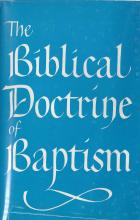Thomas F. Torrance and John Heron, The Biblical Doctrine of Baptism: A Study Document issued by the Special Commission on Baptism of the Church of Scotland (Edinburgh: Saint Andrew Press, 1960); #1960-TFT-1
Torrance, Thomas F., and John Heron. The Biblical Doctrine of Baptism: A Study Document Issued by the Special Commission on Baptism of the Church of Scotland. Edinburgh: Saint Andrew Press, 1960; #1960-TFT-1
Title page verso: First published in 1958. Reprinted 1960.
Not a reprint of #1958-126. Typesetting and paper is different than the Interim Reports.
"Introductory Note," p. (6), by "T. F. Torrance, Convener; John Heron, Secretary." The text of this Introduction is found below in the Abstract field of this record.
THE Special Commission on Baptism was appointed in 1953 by the General Assembly of the Church of Scotland "to carry out a fresh examination of the Doctrine of Baptism, and through its report to the General Assembly, and in any other ways it may find desirable, to stimulate and guide such thought and study throughout the Church as may lead to theological agreement and uniform practice."
The Doctrine of Baptism must be founded on the teaching of Holy Scripture. Accordingly the first stage in the work of the Commission was to make a thorough study of the Biblical Doctrine. The fruits of this were published in its Interim Report in 1955, which was sent down to Presbyteries for study and comment. A great mass of comment and criticism was received from Presbyteries and from scholars in our own and other countries.
These comments and criticisms have been carefully studied by a sub-committee consisting of the Rev. Wm. Lillie, D.D., of the University of Aberdeen (Convener), the Rev. Prof. James Barr, B.D., and the Rev. R. A. S. Barbour, M.C., B.D., both of the University of Edinburgh, and the Rev. D. F. S. Dick, M.C., B.D., together with the Convener and Secretary of the Commission. In the light of all this the 1955 Report has been re-written in a rather shorter, and, we hope, clearer form, and is herewith made available to all who are interested.
It is published by the Commission as a study document, in partial fulfilment of its remit, in the hope that it will play a part in stimulating and guiding the thought and study through which we believe God will lead us to a common mind in obedience to His Word.
T. F. Torrance, Convener. John Heron, Secretary.
- I. The Antecedents of Christian Baptism, 11.
- A. The Old Testament (The Covenant, Circumcision, Cleansing by Water).
- B. Late Judaism (The New Covenant, Cleansing by Water, The Admission of Proselytes).
- C. John the Baptist.
- II. Baptism and the Salvation Events, 14.
- A. Baptism and Gospel.
- B. Nativity and Incarnation.
- C. The Baptism of Jesus.
- D. The Institution of Baptism.
- III. The Apostolic Interpretation of Baptism, 22.
- A. Baptism as Cleansing in the Blood of Christ (Note: Immersion and Affusion).
- B. Baptism as Participation in Christ's Death and Resurrection (Participation in Christ's Death, Participation in Christ's Resurrection, In Christ, Christ in Us, Infant Baptism and the Lord's Supper, Note: The Sacramental Mode of Speaking).
- C. Baptism as Regeneration.
- D. Baptism Common to Christ and His Church.
- E. Baptism as the Seal of the Spirit.
- F. Baptism as a Sacrament of the Incarnation and the New Creation in Christ.
- G. The Fruit of Baptism.
- IV. The Place of Children in Christian Baptism, 45.
- A. Preliminary Arguments (Jewish Practice, Baptism of Households, Practice of the Early Church).
- B. Children in the New Covenant.
- C. Children in the Gospels.
- D. Children in the Epistles. (Note: The Participation of Children in the Lord's Supper.)
- V. Towards a Formulation of the Doctrine of Baptism, 55.
- A. Baptism is Initiation into a Saving Relationship with Christ, Rather than the Mechanical Receiving of a Gift.
- B. Baptism depends for its Efficacy primarily on the Faithfulness of God, and only secondarily on our response of faith.
- (1) The Faithfulness of God (God's Faithfulness in His Word; God's Faithfulness in the Covenant Relationship).
- (2) The Faith of the Recipient (Faith in God's Promise; The Faith of the Congregation; The Faith of the Parents; The Faith of the Child).
- C. The Divine and Human Aspects of the Sacrament must neither be confused nor separated.
- Appendix: Our Approach to the Biblical Teaching, 65.
- Oklahoma History of Science Collections copy donated by Kerry Magruder.
- 263 views

